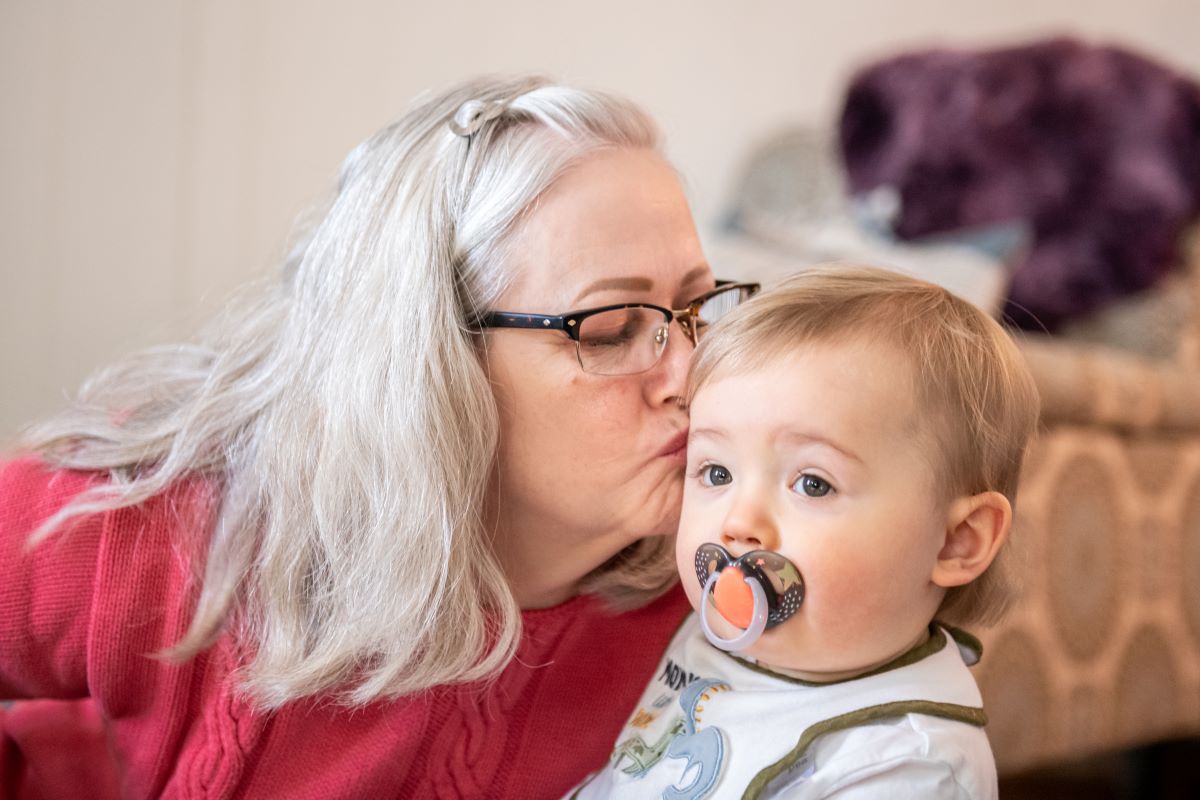100% survival after three years: Reading woman shares her heart transplant story at Hershey Medical Center

“I have to get back to work. My next case starts at 12:30.” That’s what Lois Angelisanti, a registered nurse from Reading, Pa., remembers saying on the day 13 years ago when she went to get pre-surgery testing prior to a scheduled foot surgery.
That testing included a 12-lead electrocardiogram of her heart, which Angelisanti figured was just routine. “But the next thing I knew, the room was filled with doctors,” she says. At 50 years old and just 120 pounds, she was having a heart attack—and she didn’t even know it. The cause: cardiomyopathy, a disease that weakens the heart muscle.
Angelisanti’s cardiomyopathy eventually grew so severe, she needed a heart transplant. She chose Penn State Health Milton S. Hershey Medical Center, where the heart transplant team performed her procedure in January 2017. Five years later, she’s fully active. “I walk, talk, sing, laugh, garden, go to church, clean my house and babysit my grandson, Landen,” she says.
Her remarkable journey reflects the comprehensive care provided by the Milton S. Hershey Medical Center’s heart transplant program. And the team’s care ranks among the nation’s best. According to data from the Scientific Registry of Transplant Recipients (SRTR) published in January 2022, the program achieved a remarkable 100% three-year patient survival rate. In addition, the program’s one-year patient survival rate is 94.66%, above the national average of 91.24%.
SRTR data covers transplants from July 1, 2018, through March 12, 2020, and from June 13, 2020, through Dec. 31, 2020. SRTR omits data from March 12, 2020, through June 12, 2020, due to impacts of the initial COVID-19 surge.
Those results don’t surprise Angelisanti, who chose Hershey Medical Center based on its successful heart transplant outcomes. “A lot of people were encouraging me to go to a big hospital in Ohio for my transplant, but when I looked into it, I saw Hershey Medical Center had good outcomes and a lot more patients, too,” she says. “So, I said, I’ll stay local, where I feel I should be.”
‘You never feel like you’re alone’
From the day of her heart transplant on, Angelisanti relied on the guidance and fellowship of Taylor Hodges, a registered nurse and heart transplant coordinator with Hershey Medical Center. Today, when Hodges calls to check in on Angelisanti, they chat like best friends.
“Lois always asks about my kids. We’re on a first-name basis,” Hodges says. “She’s kinda like family. She’s so sweet. Most of the time when I call her, I don’t even tell her who it is. She just answers and says, ‘Hello, Taylor.’”
Hodges is part of a team of four Hershey Medical Center heart transplant coordinators — two pre-transplant and two post-transplant — who serve as the main point of contact for patients. “Anything they need, they come to us, call for us,” Hodges says.
For Angelisanti, Hodges was a lifeline. Ten months after her transplant, Angelisanti began noticing potential signs of rejection. “I called Taylor and said I’m coughing and getting a little short of breath,” Angelisanti says. “She said, oh my gosh, Lois, get in here right now!” A change in antirejection medication helped Angelisanti recover without the need for any additional surgeries.
“At Hershey Medical Center, you never feel like you’re alone because you’re not,” Angelisanti says.
Heart transplant coordinators like Hodges also help connect patients with members of a heart transplant team that includes surgeons, cardiologists, pharmacists, social workers, counselors, dietitians and financial coordinators.
“Having 100% survivability three years out from heart transplantation speaks to the expertise of every single person on our team across the entire patient journey,” says transplant surgeon Dr. Behzad Soleimani, who performed Angelisanti’s procedure. “The margin between success and failure for transplant surgeons is very narrow, so everybody who provides care for a patient over a three-year period must do their jobs perfectly.”
Her ‘hallelujah’ moment
Looking back on her five-year heart transplant journey, Angelisanti, now 63, will never forget a photo she took with her daughter, Amanda, the day after her surgery. “We’re both smiling, and I call that my hallelujah photo,” she says. “I give all my success to God and my faith.”
She also recalls the care she received from Hershey Medical Center’s nursing staff. “They are absolute angels,” she says. “I never once needed anything. You would think I was the only patient there the way they treated me.”
Today, Angelisanti returns to Hershey Medical Center for bloodwork once a year, and she no longer needs heart biopsies that check for potential rejection. While she won’t resume her nursing career, she enjoys crocheting, cooking homemade Italian dinners and spending time with her daughter, two sons and four grandchildren.
And as someone who didn’t know she was having a heart attack until after the fact, Angelisanti shares a potentially lifesaving message with other women. “We don’t feel our symptoms,” she says. “I had no chest pain. No arm tightening. No jaw pain. So, if you feel anything—even a flutter in your chest—don’t ignore it.”
If you're having trouble accessing this content, or would like it in another format, please email Penn State Health Marketing & Communications.
